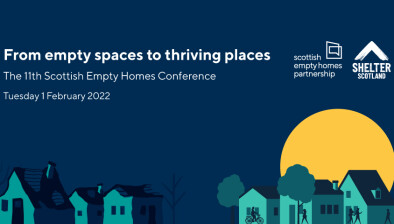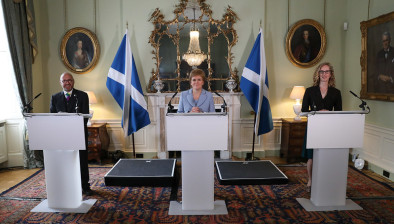Glasgow empty homes project saves £1m

Empty homes work in Glasgow has unlocked £1 million in VAT savings and boosted the delivery of much-needed affordable housing.
The project to bring private empty homes back into use is being carried out by Glasgow Shared Services Empty Homes Project, which is a partnership between the Scottish Empty Homes Partnership (SEHP), Glasgow City Council and Glasgow Housing Association.
The £1m VAT savings were realised by using a dedicated Empty Homes Officer who ensured that properties being renovated were claiming the VAT reduction applicable to homes that had been empty for more than two years – which carry a 5% VAT level as opposed to 20% on the materials used in renovation.
Since the project began in August 2015 more than 200 long-term private empty properties have been brought back into use. Housing associations in Glasgow are leading the way in buying long-term privately-owned empty properties while employing a dedicated empty homes officer to provide advice and information to owners. This approach not only provides much needed affordable housing but also assists in the wider regeneration of areas within the city.
The empty homes officer has worked with a range of partner housing associations across the city to identify the potential savings, which have helped bring empty properties back into use and helped in the conversion of non-residential properties into affordable housing.
The Scottish Empty Homes Partnership is funded by the Scottish Government and hosted by Shelter Scotland.
Housing minister Kevin Stewart said: “I’m delighted that the Glasgow Shared Services Empty Homes Project has brought 200 homes back into use.
“Everyone in Scotland should have a safe and warm place to call home which is why we are committed to delivering more homes and bringing empty homes back into use.
“The work of the dedicated Empty Homes Officers across Scotland has proven invaluable, including through the significant VAT savings made on the properties as well as the advice and information they have provided to property owners through this initiative.”
Adam Lang, head of communications and policy at Shelter Scotland, said: “A million pounds in VAT savings made on bringing these private empty properties brought back into use is significant and testifies to the value of having a dedicated empty homes officer.
“The example of the Glasgow project shows that by using the wide-ranging package of incentives available, including VAT reduction, renovating empty properties is a cost-effective way of increasing the supply of affordable housing at a time when demand continues to outstrip supply.”
Adam Lang added: “There are an estimated 34,000 long-term privately owned empty properties in Scotland. If returned to use they could make a significant contribution to easing Scotland’s housing crisis, which is fuelled by a shortage of housing, particularly affordable housing for social rent.
“We’d like to see more councils exploring the benefits of making empty homes a strategic priority and take another look at the incentives such as helping owners and other organisations to access VAT discounts, increased council tax revenue and increased spending in the local community. The return on investment in empty homes is a powerful reason for local authorities to explore ways of extending their empty homes work.”
Councillor Kenny McLean, city convener for neighbourhoods, housing and public realm at Glasgow City Council, said: “Glasgow’s unique approach to tackling empty homes has largely been achieved through partnership working with RSLs and targeting priority areas in the city. This has greatly contributed to successful outcomes in terms of increasing the affordable housing supply and has helped to improve property condition, facilitate common repair works, secure the appointment of factors in tenement properties and improve common areas.
“To achieve VAT savings of around £1,000,000 for our partners has been a wonderful achievement. Glasgow is the only local authority to adopt such an approach and we will continue to work with our partners to identify further opportunities for bringing long term empty properties or converting empty premises for the supply of necessary affordable housing.”









